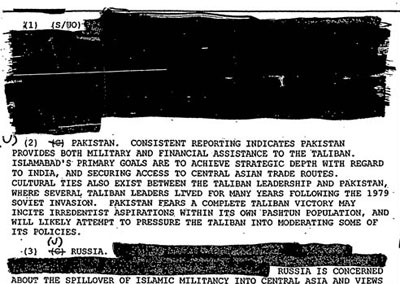Pakistan: "The Taliban's Godfather"?

Unnamed and undated, this U.S. intelligence document confirms that Pakistan is providing the Taliban with both financial and military assistance.
Obtained under the Freedom of Information Act by the National Security Archive at George Washington University, the documents reflect U.S. apprehension about Islamabad's longstanding provision of direct aid and military support to the Taliban, including the use of Pakistani troops to train and fight alongside the Taliban inside Afghanistan. The records released today represent the most complete and comprehensive collection of declassified documentation to date on Pakistan's aid programs to the Taliban, illustrating Islamabad's firm commitment to a Taliban victory in Afghanistan.
These new documents also support and inform the findings of a recently-released CIA intelligence estimate characterizing Pakistan's tribal areas as a safe haven for al-Qaeda terrorists, and provide new details about the close relationship between Islamabad and the Taliban in the years prior to the U.S. invasion of Afghanistan. Declassified State Department cables and U.S. intelligence reports describe the use of Taliban terrorist training areas in Afghanistan by Pakistani-supported militants in Kashmir, as well as Pakistan's covert effort to supply Pashtun troops from its tribal regions to the Taliban cause in Afghanistan-effectively forging and reinforcing Pashtun bonds across the border and consolidating the Taliban's severe form of Islam throughout Pakistan's frontier region.
Also published today are documents linking Harakat ul-Ansar, a militant Kashmiri group funded directly by the government of Pakistan, to terrorist training camps shared by Osama bin Laden in Taliban-controlled Afghanistan.
Of particular concern was the potential for Islamabad-Taliban links to strengthen Taliban influence in Pakistan's tribal regions along the border. A January 1997 cable from the U.S. Embassy in Pakistan observed that "for Pakistan, a Taliban-based government in Kabul would be as good as it can get in Afghanistan," adding that worries that the "Taliban brand of Islam…might infect Pakistan," was "apparently a problem for another day."
Now ten years later, Islamabad seems to be acknowledging the domestic complications that the Taliban movement has created within Pakistan. A report produced by Pakistan's Interior Ministry and obtained by the International Herald Tribune in June 2007 warned President Pervez Musharraf that Taliban-inspired Islamic militancy has spread throughout Pakistan's tribal regions and could potentially threaten the rest of the country. The document is "an accurate description of the dagger pointed at the country's heart," according to one Pakistani official quoted in the article. "It's tragic it's taken so long to recognize it."
Islamabad denies that it ever provided military support to the Taliban , but the newly-released documents report that in the weeks following the Taliban takeover of Kabul in 1996, Pakistan's intelligence agency was "supplying the Taliban forces with munitions, fuel, and food." Pakistan's Interservice Intelligence Directorate was "using a private sector transportation company to funnel supplies into Afghanistan and to the Taliban forces." Other documents also conclude that there has been an extensive and consistent history of "both military and financial assistance to the Taliban."
The newly-released documents also shed light on the complexity of U.S. diplomacy with Pakistan as the State Department has struggled to maintain the U.S.-Pakistan alliance amid concerns over the rise of the Taliban regime. In one August 1997 cable, U.S. Ambassador Thomas W. Simons advises, "Our good relations with Pakistan associate us willy-nilly, so we need to be extremely careful about Pakistani proposals that draw us even closer," adding that, "Pakistan is a party rather than just a mediator [in Afghanistan]." In another 1997 cable, the Embassy asserts that "the best policy for the U.S. is to steer clear of direct involvement in the disputes between the two countries [Pakistan and Iran], and to continue to work for peace in Afghanistan."
As to Pakistan's end-game in supporting the Taliban, several documents suggest that in the interest of its own security, Pakistan would try to moderate some of the Taliban's more extreme policies. But the Taliban have a long history of resistance to external interests, and the actual extent of Pakistani influence over the Taliban during this period remains largely speculative. As the State Department commented in a cable from late-1995, "Although Pakistan has reportedly assured Tehran and Tashkent that it can control the Taliban, we remain unconvinced. Pakistan surely has some influence on the Taliban, but it falls short of being able to call the shots."
sfux - 16. Aug, 08:46 Article 5330x read
















































